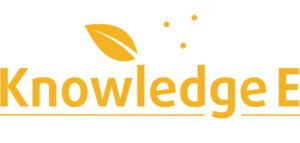
Did you know that even though the Open Access initiative is only a few decades old, there are already over 16,500 Open Access journals indexed in the Directory of Open Access Journals (DOAJ)?
The Open Access movement is growing rapidly and it’s no wonder given the substantial benefits of Open Access for journals, researchers, institutions, policymakers, and the general public — from increased discoverability and impact of research, to decreased barriers for researchers and greater equity of access.
Knowledge E is committed to supporting the Open Access movement, in line with its vision of developing ‘a more knowledgeable world’. We believe that increasing the accessibility and visibility of research is key to ensuring the sustainability of scholarly communications ecosystems, supporting diverse research communities and the needs of the wider public.
As part of this year’s Open Access Week, we decided to interview two of our journal editors from different regions and fields of research to find out a bit more about why they chose to publish Open Access and what they think the benefits of this publishing model are.
Dr. Nazik Elmalaika O.S. Husain, Assistant Editor in Chief – Sudan Journal of Medical Sciences (SJMS)
Since 2006, SJMS has provided an international forum for interdisciplinary discussions with the aim to improve clinical care, guide further medical research and help provide innovative solutions to the health challenges that face Sudan and the wider Sub-Saharan region. This interview has been edited for clarity.
Q: Why did your organisation decide to publish Open Access?
NH: Omdurman Islamic University decided to publish Open Access to eliminate price barriers for readers and reduce permission requirements. Furthermore, many studies demonstrate that Open Access literature receives more citations than subscription publications.
Q: Why is Open Access important for your discipline?
NH: Open Access allows medical evidence that can impact the policies and practices that shape population health to be widely distributed and freely available to all, for not only academic researchers, but also medical professionals, teachers, policymakers, and the general public.
Q: What do you think have been the benefits of publishing Open Access for your journal and your researchers?
NH: For the journal, publishing Open Access enables the results of scholarly research to be disseminated more rapidly and widely. Scientific research shows that publishing Open Access demonstrably leads to more citations and more impact because of the worldwide visibility without barriers. For researchers, Open Access means more readers, more potential collaborators, more citations for their work, and ultimately more recognition for them and their institution.
Q: How, if at all, do you think that the impact of your journal’s research has been affected by being published Open Access?
NH: Statistics show that the visibility and citations of the manuscripts published in SJMS have increased tremendously.
Q: What would you say to other journals that are considering whether to start publishing Open Access?
Open Access is a good idea. It gives universal access to scientific knowledge and brings benefits on many different levels. Overall, when knowledge and ideas go free, it contributes to improved research, education, public enrichment, and economic growth.
Natasha Mansur, Managing Editor – Gulf Education and Social Policy Review (GESPR)
GESPR is a bilingual journal, dedicated to providing education and social policy research insights on the Gulf region for regional and international scholars, practitioners, organisations and policymakers, to inform research, policy and programmatic agendas in the Gulf and beyond. This interview has been edited for clarity.
Q: Why did your organisation decide to publish Open Access?
NM: The Al Qasimi Foundation’s decision to publish GESPR Open Access is rooted in its core values of disseminating evidence-based peer-reviewed high-quality research equitably to reach both local and global scholars and readers. The foundation’s interest in developing the Gulf region’s capacity for research activities including the consumption of research and policy discussions played a key role in launching GESPR in an Open Access format.
Q: Why is Open Access important for your discipline?
NM: Open Access is particularly important for the disciplines of education and social policy. As non-STEM fields, funding can often be more limited for research in these fields. The need for the availability of Open Access research is especially critical in light of paywalls that restrict access to scholarship for scholars due to geographic and other forms of marginalization.
Q: What do you think have been the benefits of publishing Open Access for your journal? For your researchers? For your readers? How, if at all, do you think that the impact of your journal’s research has been affected by being published Open Access?
NM: Publishing Open Access with no author fees for our researchers and free access for our readers has been a boon. Some of the benefits include:
• An extended reach globally to disseminate knowledge that may be cited more widely and in a quicker time frame
• Creating greater connections between researchers and research institutions to pave the way for further collaborations
• Giving voice to local researchers
• Contributing to research that can make an impact
The journal publishes research in both English and Arabic. Having this bilingual scholarship made available to all has undoubtedly extended knowledge outreach. Moreover, providing a platform for high-quality Open Access articles in Arabic has increased the visibility and importance of research in languages other than English.
Q: What would you say to other journals that are considering whether to start publishing Open Access?
NM: For any new journal, a lengthy planning phase is necessary to map the field and create a meaningful strategy to promote the journal to both new and well-established scholars who may hold misconceptions about the quality of an Open Access journal. It is also important for those journals who are considering the Open Access model to make a meaningful attempt to publish high quality research by being diligent in ensuring the quality of peer review.
Q: Is there anything about Open Access that you wish readers and/or researchers understood better? Are they any misconceptions that you find frustrating?
NM: An Open Access journal should not be assumed to be a low-quality publication. This misconception is an unintended consequence of predatory journals that have exploited the Open Access model while demanding substantial author fees for little or no services.
Q: How do you think that the Open Access movement could be more successful?
NM: The Open Access movement can be more successful by creating platforms of networking events such as the Open Access Week to dispel myths and misconceptions of the Open Access movement. Furthermore, increasing awareness about how to detect predatory journals and perhaps creating more regulations for journals which publish in the Open Access space could increase the prestige of the Open Access model and increase the success of the Open Access movement.
Further Information:
We hope you’ve found this interesting and that it got you thinking a bit more about the different opportunities and challenges surrounding Open Access.
Don’t forget to tune in to our free symposium on the 28th of October “Towards a more knowledgeable world: Open Access research in MENA” which will present a series of talks by leading regional stakeholders and global organisations, and offer valuable insights regarding the implementation and benefits of open research practices for institutions and individuals. To learn more about the programme and register, please click here.
“Knowledge E is dedicated to supporting the discoverability and dissemination of knowledge. We are hosting this event as part of our broader mission to spread awareness about Open Access within the region and work with key stakeholders to increase the accessibility of scholarly and scientific research.” – Emily Choynowski, Head of Knowledge E Publishing.
About Open Access Week:
Open Access Week, a global event now entering its tenth year, is an opportunity for the academic and research community to continue to learn about the potential benefits of Open Access, to share what they’ve learned with colleagues, and to help inspire wider participation in helping to make Open Access a new norm in scholarship and research.
To learn more about Open Access Week, click here.
